- Home
- J. -H. Rosny aîné
The Navigators of Space Page 4
The Navigators of Space Read online
Page 4
Doumic goes on to ask: “In a society thus constituted on its true foundations, will people continue to read books? It is to be feared so, for perfection is an ideal toward which poor men may well extend all their efforts, but they will never attain it. Literary vanity still has a fine future ahead of it. What sort of books will be written in that time following ours? Let us assume writers endowed with fine faculties, capable of observation and provided with imagination, laborious and respectful of their pens, haunted by generous dreams. Let us assume that they will write novels. What will these novels be like? The question is not idle, and to resolve it we are not constrained to content ourselves with hypotheses; we have an easy means to answer it with some precision, and that is to consult the novels of Monsieur J.-H. Rosny.”
Doumic notes that less than ten years have passed since Nell Horn was published, and asks his reader to recall the movements of ideas, currents of sensibility and influences that has provided the literary atmosphere of those ten years, when Naturalism was in decline, perishing “by the excess of its own narrowness and vulgarity.” By virtue of its complexity, he claims, the modern soul “attracted and troubled the most subtle analysts,” especially with respect to the “eternal problem of love,” which has become even more problematic because “from all points of the worlds of reality and dream a wind of sadness had desiccated hearts.” In Doumic’s eyes, this problem has been solved by authors who have “reinvested” in tenderness, charity and pity, if not formal evangelical religion, but Rosny, he claims, has remained defiantly immune from such influences, remaining “as far from the psychologists as the dilettantes, and from the neo-Christians as from the aesthetes.” Reading Rosny, according to Doumic, “one has the impression of traveling in a strange land, in which characters, questions, ways of thought and language are disconcertingly different.”
The essay continues: “M. Rosny, although he has already written a great deal, is little known, and his books, full as they are of talent, have few readers. A few enthusiasts for his work reckon that the semi-indifference of the public is one of the great injustices of the modern epoch, and a confirmation of our frivolity. It is only just to acknowledge that M. Rosny has not made any concession to easy success; he has not lowered himself to employing any of the assured means that certain authors of the era have used to sell their books.” Doumic also notes that Rosny “offers no indiscretions” regarding his person. “All that is known,” he adds, “is that person is double; J.-H. Rosny is one author in two individuals: his books are the collaboration of two brothers arrived at such a degree of intellectual penetration that on any given subject, their ideas being communal, they can set to work, each writing the same page on his own account. Compared with this fraternity, that of the Goncourts was, as is evident, a fraternity of enemy brothers.”
“What first leaps to the eyes,” Doumic says, when he moves on to a consideration of Rosny’s actual texts, “is that the author of these books has, I certainly do not want to say a scientific turn of mind, but a taste for science. Almost all the characters he puts on stage are, if not scientists, half- or quarter-scientists. This one is a physician, that one a medical student, others chemists of some sort. They are writing a considerable work, whether it is on The Elimination of the Nordic type from the Aryan Family or a History of Modern Migrations; if they are not dreaming of some Metaphysics of Animals it is because they are absorbed in a project on Tranformist Legislation. Each one following his aptitudes and his tastes, they are trying to pick up some crumbs of universal knowledge. There is the young telegraphist Marc Fane. He has, as yet, only received a professional education when he conceives a project of working for the benefit of humankind. Persuaded that everything is contained in the history of ideas, and that to accomplish the most meager progress for humankind it is necessary to know all the needs of modern society, he sets out to complete his studies. He outlines a program for himself compared with which Pico della Mirandola’s was child’s play. All the sciences will be represented therein, and each will have its ration of time. ‘The ration of some branches would only be five minutes a week—design, astronomy, music. Gradually, that would increase to ten hours of politics and twenty hours of sociology.’ Naturally, the sciences that attract Marc Fane preferentially are the least advanced, the least complete, those which have the least scientific certainty and the most apparatus thereof. Marc Fane thus acquires all the elements of knowledge, with no guidance, no criticism and no order, pell-mell…
“I am wary of confusing M. Rosny with his characters and assuming that he is fabricating their biographies with fragments of his own. I merely remark that all the sciences inscribed in Marc Fane’s program have left some memory of themselves in M. Rosny’s novels. Astronomy holds an important place there. Constellations, planets and stars are noted there by their names… Geology, paleontology, anthropology, ethnology, zoology and a few related sciences are for M. Rosny the ordinary repertoire of his comparisons…
“M. Rosny effortlessly makes himself the contemporary of cave-men. While our gaze timidly ventures into a corner of society or the soul, for him moves easily into a period of time more than twenty thousand years in the past, and which has no limit in the future. Little interested in individuals, he attaches himself passionately to questions of species and race… It is from the same viewpoint that M. Rosny envisages social questions; natural rights, the division of labor, the division of wealth, heritage, family, Malthusianism, population, depopulation and repopulation. Science presents the question of adultery to him in an aspect which, in order not to be the sentimental and passionate aspect to which novelists usually confine it, has no more probability of being its true aspect ‘the indomitable instinct that desires a renewal of selection’…
“This worship of science is, in M. Rosny, essential and fundamental. It is that to which all his theories are attached or subordinate; it is the reason that he has devoted himself to literature, and it is the source of his aesthetics… To extract from the scientific work of the century the elements of literature that it contains—such is the task that he has assigned himself and to which he attempts to adapt the form of the novel.”
I have quoted this at such length because, setting Doumic’s obvious disapproval aside, it is an accurate and perceptive account of the basic outlook of Rosny’s early work, establishing the ideative context from which his early scientific romances emerge. After more detailed consideration of Nell Horn and Le Bilateral, Doumic brings his textual analysis to the conclusion that: “All these novels are those of a good pupil of the naturalist school. One could say the same of Immolation, a peasant study reminiscent of the most brutal short stories of Maupassant [and] Le Termite, a study of literary mores, the most frankly detestable I think, of the author’s books, simultaneously pretentious and dull.” Having ignored Rosny’s other scientific romances, perhaps on the grounds that they were too short to qualify as romans, he tries to accommodate Vamireh, Rosny’s first roman prehistorique, to his argument by claiming (inaccurately) that “in spite of its title and subtitle, [it] is nothing but a novel composed according to the formula and by the ordinary methods of the documentary school…”
Doumic does concede that Rosny’s more recent works are of a different kind, being more accessible in form and containing more human interest—he adds that they are less “hair-raising”—but is keen to progress to an account of Rosny’s literary faults, and thus pays no detailed attention to anything published after Vamireh. His primary complaint is the lack of continuity in the novels. “The episodes succeed one another at random, devoid of connection rationale or appreciable utility, developed in inverse proportion to their importance: no order, no proportion, no choice, no taste.” He also complains bitterly about Rosny’s neologisms and odd forms of expression, which “do not enrich the language,” claiming that he violates the rules of grammar because he does not know them and suggesting that his improprieties of expression are based in murkiness of thought, although he “hastens to remark”
that such faults are less common in the more recent works.
All of these criticisms have some justification, although the oddness of Rosny’s modes of expression is not so obvious in translation, where a necessary adaptation to English grammatical and syntactical conventions inevitably obliterates some of their eccentricity in respect of French conventions. It is, however, worth noting that Doumic does not seem to realize that the lack of continuity in Rosny’s works is a by-product of their patchwork method of composition rather than a deliberate artifact, and that he completely ignores the most important factor mitigating all these supposed facts: that Rosny’s imaginative reach, if not his grasp, was unprecedented.
The simple fact is that Rosny would not have been able, let alone willing, to grope so far into the unknown for new ways to look at human nature and the cosmic environment of humankind had he been the kind of writer who planned his works more meticulously in advance and adapted his works more carefully to patterns of reader demand, in terms of their structure as well as their content. In brief, his work could not have been so worthwhile in some respects had he not been so seemingly faulty in others; Doumic, who had very rigid ideas about what writers ought to be doing and how, could not even see the merit in Rosny’s imaginative endeavors, and thus thought it appropriate to condemn him—but lovers of speculative fiction inevitably take the opposite view: that his achievements in the realm of speculation justify and excuse the essential awkwardness of compositional method.
Inevitably, Doumic rounds out his essay—after a few mildly hypocritical paragraphs complimenting Rosny for certain merits he retains despite his faults, though not the one just identified—by returning to the futuristic thrust of his opening paragraphs, venturing into prediction: “But even though it is of today, his oeuvre has its right to significance. It will be yet another ornament of an epoch in which that which was once high intellectual culture will founder… That is what we have followed with sympathetic curiosity in M. Rosny’s novels: it is the future of the novel in an enlightened barbarism, in which art and literature have beaten a retreat before triumphant sociology.”
In this respect, of course, Doumic was utterly and absolutely mistaken; not only was Rosny’s early work not a symptom of things to come in the broader literary world, but it was not an indication of the way in which his own career would be forced—and, indeed, had already begun—to develop. The scientific outlook that he tried to cultivate did not triumph, either in education or literature, but fell instead into a peculiar and perverse ignominy, treated almost universally with the kind of blind and stupid hostility of which Doumic was so proud. That might easily have prevented Rosny from ever venturing back into the realms of speculative fiction, but in fact it did not, and once Joseph Boëx was free of the shackles of his “juxtaposition” with his relentlessly unspeculative younger brother, he soon found several reasons for doing so.
After the serial publication of “La Légende sceptique” in 1889, there was an evident hiatus in the publication of Rosny’s scientific romances, although Vamireh certainly warrants consideration as a literary extrapolation of late-19th century discoveries and (mostly mistaken) theories in paleoanthropology. The novel was serialized in 1892 in the early issues of a new periodical, the Revue Hebdomadaire, whose editor was probably pleased to acquire a contribution by such an up-and-coming writer, who had already published in many of the prestigious periodicals of the day. The same periodical went on to publish Rosny’s naturalistic novel L’Impérieuse Bonté in 1893-94.
The editor of another new periodical, Le Bambou, was also sufficiently interested in Rosny to be willing to serialize work of this sort in 1893, beginning with the roman préhistorique Eyrimah (reprinted in book form 1896; tr. in vol. 4) and continuing with an account of unknown human races surviving in a remote part of Asia, “Nymphée” (tr. in vol. 2 as “Nymphaeum”). Both stories are conspicuously patchy, and the second is finished off in a brutal fashion, after having already undergone some awkward changes in direction, so it seems highly likely that both were cobbled together from pre-existent materials dating back to the mid-1880s.
During the remainder of the two brothers’ partnership, only four short scientific romances and one further prehistoric romance appeared under the J.-H. Rosny name. The brief sardonic prehistoric romance, “Nomaï” (tr. in vol.4) appeared in the Revue Parisienne in 1895. “Un Autre Monde” (Revue de Paris 1895; tr. herein as “Another World”), which extrapolates—rather uneasily—an idea sketched out in “La Légende sceptique,” was almost as ground-breaking as “Les Xipéhuz,” but the other items are noticeably more conservative. As previously noted, “La contrée prodigieuse des cavernes” probably derives from the mid-80s manuscript identified by Rosny as Cavernes, and “Les Profondeurs de Kyamo” (1896; tr. in vol. 2 as “The Depths of Kyamo”), which features a further adventure of the same protagonist, may well come from the same source. Both are in the same vein as “Nymphée,” featuring the discovery of variant “dominant species” in remote “lost land” enclaves. Although there is no detailed bibliography of Rosny, and the full extent of his periodical publications has not been mapped, it is possible that these two stories were not published in periodicals, but appeared for the first time as the first two items in a collection issued by Plon under the title Les Profondeurs de Kyamo, whose other contents, carefully separated in the table of contents, are all mundane.
“Le Voyage” (1900; tr. in vol. 2 as “The Voyage”) is also a lost land story, which could easily have featured the same protagonist as “La contrée prodigieuse des cavernes” and “Les Profondeurs de Kyamo” but refrained, perhaps because it begins in a very different style, with an extrapolation of one of the prose poems patched into “La Légende sceptique.” It too seems to have been dropped into a collection of mostly-naturalistic stories rather arbitrarily, without any previous periodical appearance having been noted by modern bibliographers, and probably antedated that publication by some—perhaps many—years. No more prehistoric or scientific romances appeared in print while the two brothers’ partnership lasted—or, indeed, for two years thereafter, in spite of the fact that H. G. Wells had demonstrated in the interim that scientific romance could be popular, as well as interesting in its extrapolations.
References to Rosny as a “French Wells” began to be made as early as 1896, when the press associated with the Mercure de France—whose literary editor, Henry Davray, was H. G. Wells’s French translator—issued a small volume entitled Le Cataclysme, containing the title story and “Les Xipéhuz,” presumably in order to cement the claim to his priority. Such references did not, however inspire Rosny to any immediate further attempt to justify the label, or to emphasize the distinctness of his own speculative fiction. In spite of his “poetic passion” for science and speculative thought, Joseph Boëx seems to have resolutely refused to embark on any further ventures of that kind between the publication of “L’Autre monde” and the formal termination of his literary partnership with his brother.
We can only speculate as to the role Justin Boëx might have played in dissuading his elder brother from experiments in scientific romance while they were sharing their pseudonym, but it seems highly probable that their collective change of status to “J.-H. Rosny de l’Académie Goncourt” also had much to do with it. In spite of the fact that the Goncourt Academy had been conceived as a protest against the conservatism of the official Académie, its members were nevertheless defensive of their own aesthetic credentials.
Oddly enough, the first Prix Goncourt, awarded in 1903, did go to a work that some might consider to be a scientific—or, at least, metaphysical—romance, Force ennemie [Hostile Force] by John-Antoine Nau (Eugène Torquet), but it was the work of an already-respectable writer who never did anything else of a similar ilk, and the Prix Goncourt was never subsequently awarded to anything of that sort, or to anything else that might be considered a “genre” novel rather than a “literary” novel. Three of the first 20 winners (Claude Farrère, Henri B
arbusse and Ernest Pérochon) did do some work in the genres of scientific or prehistoric romance, but they won the prize for works that were very different in character. Rosny seems to have felt, once he was appointed to the Académie Goncourt, that he was somehow obliged to shun such work as unbefitting a writer of his status. He did, however, eventually borrow the speculative premise of Force ennemie for adaptation to his own speculative context in one of his more interesting exercises in hackwork, La Jeune vampire (1920; tr. in vol. 6 as “the Young Vampire”).
Rosny left no precise record of the reason why he changed his mind about the propriety of writing genre fiction, but he made no bones about the fact that, as a man who had to make a part of his living from his pen, he was obliged to do a certain amount of hackwork. In all probability, there were two significant factors involved in his decision to include some speculative fiction within that aspect of his production; one was the foundation in Paris of a number of new “middlebrow” periodicals in imitation of such English periodicals as The Strand, which had been briefly hospitable to scientific romance, and the other was the fact that he began attending a weekly salon run by Maurice Renard.

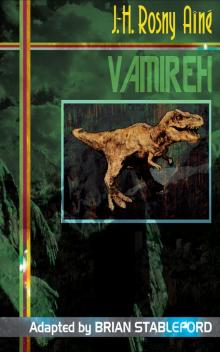 Vamireh
Vamireh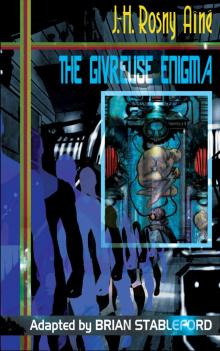 The Givreuse Enigma
The Givreuse Enigma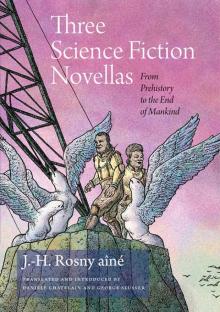 Three Science Fiction Novellas: From Prehistory to the End of Mankind
Three Science Fiction Novellas: From Prehistory to the End of Mankind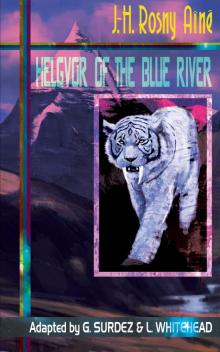 Helgvor of the Blue River
Helgvor of the Blue River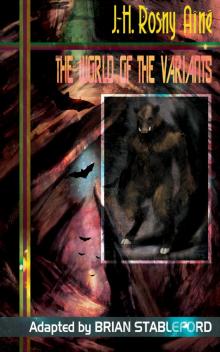 The World of the Variants
The World of the Variants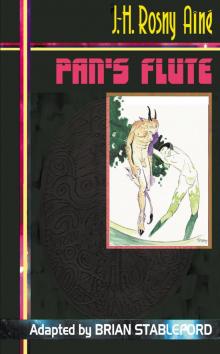 Pan's Flute
Pan's Flute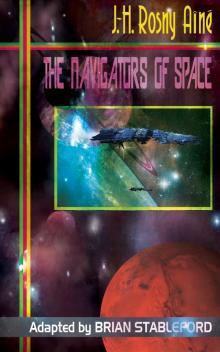 The Navigators of Space
The Navigators of Space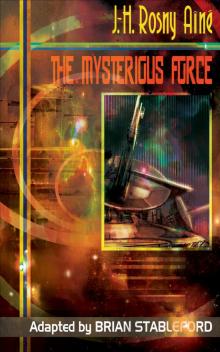 The Mysterious Force
The Mysterious Force